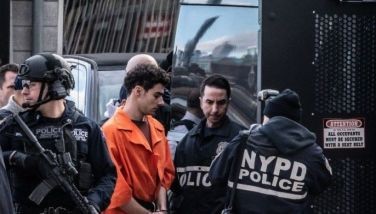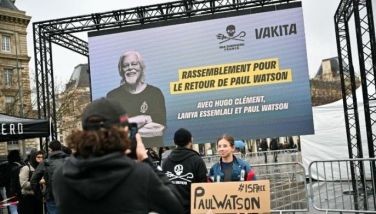Iraq premier says France to join airstrikes effort
BAGHDAD — France will join the U.S.-led airstrikes targeting extremists in Iraq as part of an expanding international effort to combat the Islamic State group, Iraq's new prime minister said after talks with the French president on Friday.
Prime Minister Haider al-Abadi's remarks came after talks with Francois Hollande, who was in Baghdad to bolster Iraq's new government as it struggles to unite the nation amid the rampage by the Islamic State group.
"In order to confront Daesh, we need aerial support from our allies," al-Abadi said, referring to the group by its Arabic acronym. "The French president promised me today that France will participate in this effort, hitting the positions of the terrorists in Iraq."
Al-Abadi spoke at a joint press conference with Hollande in Baghdad. Neither of the two leaders provided details about when the French could join the aerial campaign.
Hollande added that France has delivered four arms shipments and 60 metric tons (66 tons) of humanitarian aid to Iraq.
Hollande's trip, and an Iraq conference that Paris is hosting on Monday, are the first steps in a long-term effort against Islamic State militants, who have captured large swaths of land straddling the Syria-Iraq border and declared a self-styled caliphate.
Earlier Friday, at a press conference with Iraq's President Fouad Massoum, Hollande said the Islamic State group is waging a war on "all people who do not share their vision or ideas."
The aim of the Paris conference "is to coordinate the aid, the support (and) the actions to work for the unity of Iraq and against this terrorist group," he said.
The U.S. began launching airstrikes and humanitarian aid missions on Aug. 8 to boost the efforts of Iraqi and Kurdish security forces. The airstrikes marked a significant shift in the U.S. strategy in Iraq, where the military fully withdrew in late 2011 after nearly a decade of war.
French airstrikes would likely start in coordination with the United States — but would not include ground troops, a senior French official said Thursday, speaking on condition of anonymity according to government policy.
Hollande's visit to Iraq is his first since the crisis escalated with the Islamic State group's blitz and the fall of Iraq's second-largest city Mosul in June.
Hollande has been one of the most militarily aggressive leaders in modern French history, sending troops to Mali and Central African Republic. France was the first European government to start arming Kurdish forces against Islamic State militants last month.
France's head of state traveled to the Kurdish capital Irbil late Friday to meet with Massoud Barzani, the president of the Kurdish Regional Government, before departing for Paris.
At a press conference with Barzani, Hollande noted that Kurdish forces have made good use of the weapons supplied by France, saying "these deliveries were decisive in reversing the balance of force."
France's readiness to intervene reflects its fears of violence on its own soil. Authorities are struggling to stop the flow of hundreds of French radicals who have joined extremists in Syria and Iraq and who could return to Europe to stage attacks. A Frenchman who went to Syria and held American journalists hostage is the chief suspect in a May attack on a Brussels Jewish museum that left four dead.
"These people have only one idea: to rape, crucify, assassinate. We must all mobilize to make them retreat, neutralize them and get rid of them," French Foreign Minister Laurent Fabius said this week of the Islamic State militants.
The French government — which vigorously opposed the U.S.-led invasion of Iraq a decade ago — insists any action be at the request of the Iraqi government. France does not want to be a pawn or lapdog in a U.S.-run war, but will play a "significant" role in the coalition and make its own decisions on what to contribute, the French official also said on Thursday.
Unlike the U.S., France is stopping short of possible action in Syria, at least for now. The French fear that airstrikes on extremists in Syria could strengthen President Bashar Assad and raise international legal problems.
During Friday's press conference, al-Abadi urged the world to also take action against militant groups in neighboring Syria, where the Islamic State controls much of the country's east.
"These groups are attacking Iraq and the international community should shoulder the responsibility to stop these attacks," he added.
In violence Friday, a car bomb exploded near an outdoor market in the Iraqi capital's southeastern neighborhood of New Baghdad, killing seven people and wounding 21, police officials said.
Elsewhere in Baghdad, bombings in three different neighborhoods killed a total of 10 people and wounded 31. Medical officials confirmed the casualty figures. All officials spoke on condition of anonymity because they were not authorized to speak to the media.
- Latest
- Trending






























